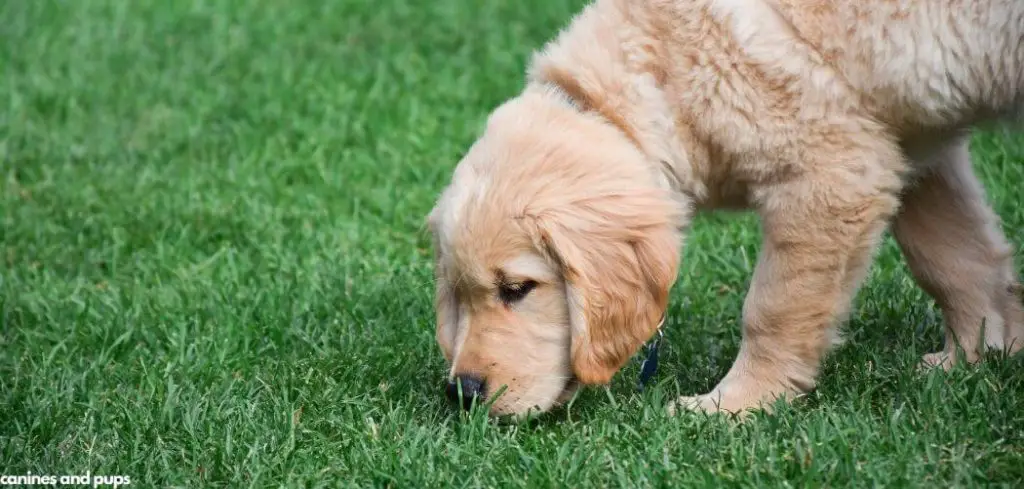Dogs occasionally nibbling on grass is not unusual, but when a dog suddenly begins excessively eating grass, it becomes a concerning behavior.
While some cases are harmless, this sudden change can signal underlying health issues that owners should not ignore.
We outline the common reasons why a dog may suddenly start excessively eating grass, what you can do, and when to seek veterinary help.
Dog Suddenly Excessively Eating Grass — Why It Happens
A dog may suddenly start excessively eating grass due to discomfort or a change in their dog. Dogs may resort to grass when experiencing nausea, digestive upset, nutritional imbalances, or even anxiety. In some cases, it may be linked to underlying illnesses such as gastrointestinal disease or parasites.
Stress, boredom, or sudden dietary changes can also trigger the behavior. Understanding why it happens requires observing the context and any accompanying symptoms.

Dog Suddenly Excessively Eating Grass: Common Causes
Gastrointestinal Upset
One of the most common reasons for sudden grass eating is stomach discomfort. Dogs may instinctively eat grass in an attempt to induce vomiting or soothe irritation.
Owners often notice retching, gagging, or occasional vomiting after the behavior.
While this may seem like a form of self-treatment, frequent or excessive vomiting linked to grass consumption should not be overlooked, as it may indicate an underlying gastrointestinal issue.
Read more: Dog Eating Grass and Excessive Licking (Why it happens)
Intestinal Parasites
Worm infestations such as roundworms, hookworms, or whipworms can cause stomach upset and lead to sudden changes in eating behavior, including excessive grass consumption.
Dogs with parasites may also show weight loss, diarrhea, or a dull coat. Since parasites irritate the digestive tract, the dog may be attempting to alleviate discomfort by chewing on grass.
Nutritional Deficiencies
A dog that suddenly eats large amounts of grass may be compensating for a missing nutrient in its diet.
Deficiencies in fiber, vitamins, or minerals can drive the urge to seek alternative sources of nutrition. This behavior is more common in dogs fed low-quality diets or in those with unbalanced homemade meals.
While grass itself is not a reliable source of essential nutrients, the behavior may be a signal that dietary adjustments are needed.
Nausea or Illness
Dogs experiencing nausea from conditions like gastritis, kidney disease, or pancreatitis may suddenly turn to grass eating.
This behavior is sometimes paired with drooling, licking lips, or loss of appetite. Unlike casual nibbling, sudden excessive grass eating due to illness often looks compulsive, as though the dog is urgently trying to relieve internal discomfort.
Anxiety or Stress
Behavioral factors can also explain sudden excessive grass eating. Stressful changes such as moving homes, separation anxiety, or loud environments may cause dogs to engage in repetitive behaviors, including grass consumption.
In this case, the behavior acts as a coping mechanism rather than a physical need, but it still requires attention to avoid escalating issues.
Boredom or Habit
For some dogs, especially younger ones or those lacking sufficient exercise, excessive grass eating may develop from boredom.
Dogs left alone in the yard with little stimulation may resort to chewing grass as a pastime.
Over time, this can become a habitual behavior, making it important for owners to provide proper enrichment and engagement.
What to Do If Your Dog Is Suddenly Excessively Eating Grass
If a dog begins this behavior suddenly, monitor closely for other signs such as vomiting, diarrhea, lethargy, or refusal to eat.
Providing a balanced diet with adequate fiber and nutrients may reduce the urge to seek out grass. Ensure your dog has access to clean water at all times, as dehydration can worsen digestive upset.
Addressing environmental needs is equally important. Offer interactive toys, daily exercise, and enrichment activities to reduce boredom-driven grass eating.
For dogs suspected of anxiety, maintaining a calm routine and minimizing stressors can help. Avoid using chemicals, pesticides, or herbicides in areas where your dog grazes, as ingestion of treated grass can be harmful.
If parasites are suspected, a veterinarian can perform a fecal test and prescribe appropriate deworming medication.
Adjusting your dog’s diet under veterinary guidance may also resolve deficiencies contributing to the behavior.
When to Call or Visit Your Vet
Veterinary attention is necessary if your dog’s grass eating is accompanied by concerning symptoms.
Vomiting that persists, diarrhea that lasts more than a day, or blood in the stool are red flags. Weight loss, refusal to eat, or extreme lethargy alongside grass eating should also prompt an urgent veterinary visit.
If your dog has not been dewormed recently, or if you notice a sudden, compulsive need to eat grass multiple times a day, it is best to schedule a checkup.
Dogs with pre-existing health conditions like kidney disease or pancreatitis should be evaluated quickly if new symptoms arise, since grass eating may be an early sign of worsening illness.
Read more: Dog Eating Grass Excessively (Here’s Why)
Key Takeaway
A dog suddenly excessively eating grass can be more than just a quirky habit. While some cases are harmless, this sudden change in behavior can point to digestive upset, parasites, nutritional deficiencies, or even stress-related issues.
Observing your dog’s overall health and providing proper diet, enrichment, and care can help manage the behavior.
If the habit persists or is paired with troubling symptoms, seeking veterinary advice is the safest way to protect your dog’s well-being.
